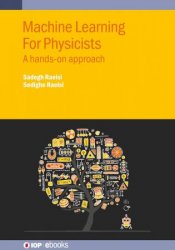Machine Learning for Physicists: A hands-on approach
- Добавил: literator
- Дата: 18-12-2023, 05:29
- Комментариев: 0
 Название: Machine Learning for Physicists: A hands-on approach
Название: Machine Learning for Physicists: A hands-on approachАвтор: Sadegh Raeisi, Sedighe Raeisi
Издательство: IOP Publishing
Год: 2023
Страниц: 234
Язык: английский
Формат: pdf (true)
Размер: 32.8 MB
This book presents Machine Learning (ML) concepts with a hands-on approach for physicists. The goal is to both educate and enable a larger part of the community with these skills. This will lead to wider applications of modern ML techniques in physics. Accessible to physical science students, the book assumes a familiarity with statistical physics but little in the way of specialised computer science background. All chapters start with a simple introduction to the basics and the foundations, followed by some examples and then proceeds to provide concrete examples with associated codes from a GitHub repository. Many of the code examples provided can be used as is or with suitable modification by the students for their own applications.
Key Features:
Practical Hands-on approach: enables the reader to use Machine Learning
Includes code and accompanying online resources
Practical examples for modern research and uses case studies
Written in a language accessible by physics students
Complete one-semester course
The main target audience of this book is university students in physics or similar disciplines. This means that we are assuming that the audience has some basic understanding of undergraduate physics, statistics, and mathematics. Students with a strong statistics background will find many of the concepts in this book familiar. Many Machine Learning techniques have their roots in statistics. We will point out some of these concepts as we encounter them. In addition, the audience needs some basic understanding of linear algebra. This is needed in particular for understanding the mechanics of neural networks (NNs), and it has applications in other techniques such as principal component analysis (PCA) as well.
Another critical requirement of this book is proficiency in a programming language and, ideally, in Python. Different programming languages and tools such as R, MATLAB, Mathematica, and Java are used for Machine Learning. However, Python is arguably the most commonly used language for Machine Learning applications. This means that there is a large community of Python programmers who can help you find the answers to your questions. Also, many of the Machine Learning and Deep Learning tools are built for Python. Please note that this does not mean that Python is better than other programming languages, only that, from a practical view, it is more convenient.
For this book, basic familiarity with programming and basic Python syntaxes are essential. Additionally, there are libraries such as NumPy, Pandas, and Matplotlib that are extremely helpful for handling and visualization of the data and are used frequently in this context. The reader is thus encouraged to become familiar with them.
Скачать Machine Learning for Physicists: A hands-on approach
[related-news] [/related-news]
Внимание
Уважаемый посетитель, Вы зашли на сайт как незарегистрированный пользователь.
Мы рекомендуем Вам зарегистрироваться либо войти на сайт под своим именем.
Уважаемый посетитель, Вы зашли на сайт как незарегистрированный пользователь.
Мы рекомендуем Вам зарегистрироваться либо войти на сайт под своим именем.
